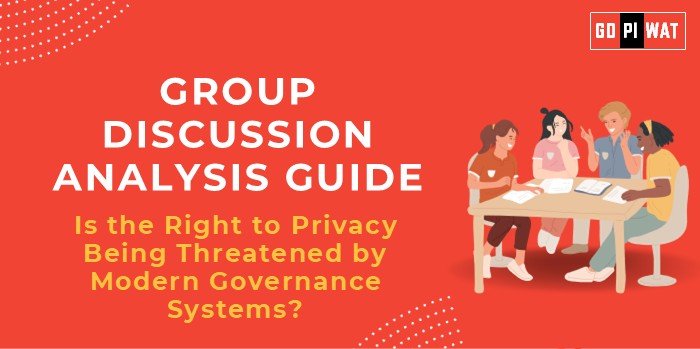📋 Group Discussion (GD) Analysis Guide
🌐 Topic: Is the Right to Privacy Being Threatened by Modern Governance Systems?
🌟 Introduction
Modern governance systems have embraced digital tools to enhance efficiency and security. However, the balance between innovation and privacy rights remains a global concern, especially with increasing surveillance and data breaches.
📊 Quick Facts & Key Statistics
- 📇 Digital Identity Adoption: Over 1.2 billion Indians enrolled in Aadhaar as of 2024, forming the world’s largest biometric identification system.
- 👁️ Surveillance Expansion: The U.S. expanded its surveillance capabilities significantly post-9/11 with laws like the Patriot Act.
- 🔒 Cybersecurity Threats: The global cybersecurity market reached $190 billion in 2023, underlining the urgent need for data protection.
- 📢 Public Sentiment: In a 2018 Pew survey, 52% of Americans expressed strong concerns about government surveillance.
🧑🤝🧑 Stakeholders and Their Roles
- 🏛️ Governments: Shape privacy policies and deploy governance tools responsibly.
- 💻 Tech Companies: Manage data securely and develop privacy-preserving technologies.
- 🌟 Citizens: Advocate for data protection rights and responsible governance.
- 🌍 Global Organizations: Set frameworks like GDPR to ensure accountability.
🏆 Achievements and Challenges
🎉 Achievements:
- 📈 Enhanced Service Delivery: Aadhaar streamlined subsidy transfers, reducing inefficiencies.
- 🛡️ Crime Prevention: Advanced surveillance has aided in identifying and preventing terrorist activities.
- 💰 Economic Growth: Investments in cybersecurity created a $190 billion industry in 2023.
⚠️ Challenges:
- 🔓 Data Vulnerability: High-profile breaches, such as AIIMS India in 2022, exposed sensitive data.
- 👁️🗨️ Overreach in Surveillance: Legislation like the Patriot Act has sparked global debates on privacy versus security.
- 🌐 Inconsistent Regulations: Lack of a unified global standard complicates enforcement and accountability.
🗣️ Effective Discussion Approaches
📌 Opening Approaches:
- 📊 Data-Driven Start: “With over 1.2 billion enrolled in Aadhaar, digital governance has advanced significantly, but privacy remains a critical issue.”
- ⚖️ Contrast Example: “While surveillance prevents crime, it also risks eroding personal freedoms—a delicate balance every society must navigate.”
🎭 Counter-Argument Handling:
- Acknowledge the need for security but emphasize proportional and transparent measures.
🔍 Strategic Analysis of Strengths & Weaknesses
- ✅ Strengths:
- Enhanced governance efficiency.
- Growing cybersecurity investments.
- ❌ Weaknesses:
- Weak privacy regulations.
- Rising incidents of cyberattacks.
- 📈 Opportunities:
- Adoption of privacy-focused technologies.
- Collaboration on global data protection standards.
- ⚠️ Threats:
- Public mistrust in governance systems.
- Increased exploitation of surveillance tools by authoritarian regimes.
📖 Structured Arguments for Discussion
- ✅ Supporting Stance: “Digital systems have improved governance efficiency and service delivery immensely.”
- ❌ Opposing Stance: “Privacy violations and unchecked surveillance undermine democratic values.”
- ⚖️ Balanced Perspective: “A middle path requires robust laws ensuring both privacy and governance efficiency.”
🎓 Connecting with B-School Applications
- 📘 Real-World Applications:
- Projects on balancing cybersecurity investment and operational cost.
- Case studies on privacy frameworks like GDPR or Aadhaar.
- 📋 Sample Questions:
- “What are the trade-offs between national security and individual privacy?”
- “How can businesses contribute to improving digital governance systems?”
- 💡 Insights for Students:
- Awareness of ethical concerns in governance is crucial for policy-oriented roles.
- A strong understanding of cybersecurity enhances employability in tech-focused sectors.


